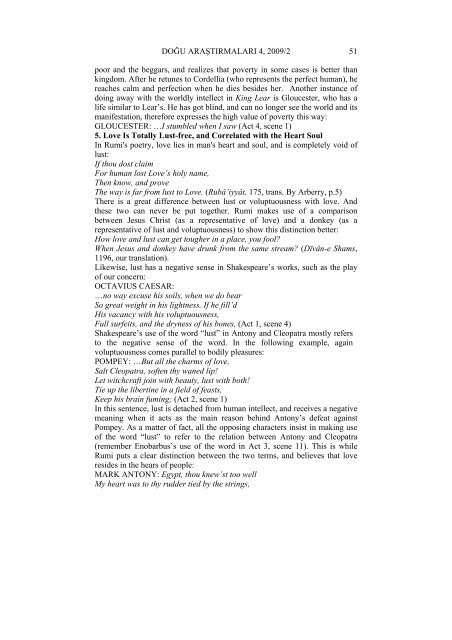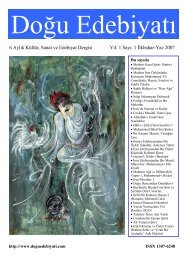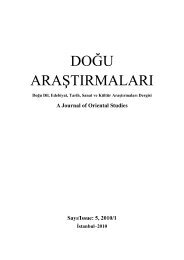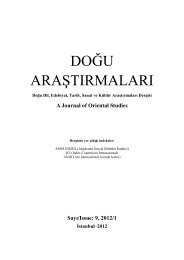A Journal of Oriental Studies Sayı/Issue - Doğu Edebiyatı
A Journal of Oriental Studies Sayı/Issue - Doğu Edebiyatı
A Journal of Oriental Studies Sayı/Issue - Doğu Edebiyatı
Create successful ePaper yourself
Turn your PDF publications into a flip-book with our unique Google optimized e-Paper software.
DOĞU ARAŞTIRMALARI 4, 2009/2 51<br />
poor and the beggars, and realizes that poverty in some cases is better than<br />
kingdom. After he retunes to Cordellia (who represents the perfect human), he<br />
reaches calm and perfection when he dies besides her. Another instance <strong>of</strong><br />
doing away with the worldly intellect in King Lear is Gloucester, who has a<br />
life similar to Lear’s. He has got blind, and can no longer see the world and its<br />
manifestation, therefore expresses the high value <strong>of</strong> poverty this way:<br />
GLOUCESTER: …I stumbled when I saw (Act 4, scene 1)<br />
5. Love Is Totally Lust-free, and Correlated with the Heart Soul<br />
In Rumi's poetry, love lies in man's heart and soul, and is completely void <strong>of</strong><br />
lust:<br />
If thou dost claim<br />
For human lost Love’s holy name,<br />
Then know, and prove<br />
The way is far from lust to Love. (Rubâ’iyyât, 175, trans. By Arberry, p.5)<br />
There is a great difference between lust or voluptuousness with love. And<br />
these two can never be put together. Rumi makes use <strong>of</strong> a comparison<br />
between Jesus Christ (as a representative <strong>of</strong> love) and a donkey (as a<br />
representative <strong>of</strong> lust and voluptuousness) to show this distinction better:<br />
How love and lust can get tougher in a place, you fool?<br />
When Jesus and donkey have drunk from the same stream? (Dīvân-e Shams,<br />
1196, our translation).<br />
Likewise, lust has a negative sense in Shakespeare’s works, such as the play<br />
<strong>of</strong> our concern:<br />
OCTAVIUS CAESAR:<br />
…no way excuse his soils, when we do bear<br />
So great weight in his lightness. If he fill’d<br />
His vacancy with his voluptuousness,<br />
Full surfeits, and the dryness <strong>of</strong> his bones, (Act 1, scene 4)<br />
Shakespeare’s use <strong>of</strong> the word “lust” in Antony and Cleopatra mostly refers<br />
to the negative sense <strong>of</strong> the word. In the following example, again<br />
voluptuousness comes parallel to bodily pleasures:<br />
POMPEY: …But all the charms <strong>of</strong> love,<br />
Salt Cleopatra, s<strong>of</strong>ten thy waned lip!<br />
Let witchcraft join with beauty, lust with both!<br />
Tie up the libertine in a field <strong>of</strong> feasts,<br />
Keep his brain fuming; (Act 2, scene 1)<br />
In this sentence, lust is detached from human intellect, and receives a negative<br />
meaning when it acts as the main reason behind Antony’s defeat against<br />
Pompey. As a matter <strong>of</strong> fact, all the opposing characters insist in making use<br />
<strong>of</strong> the word “lust” to refer to the relation between Antony and Cleopatra<br />
(remember Enobarbus’s use <strong>of</strong> the word in Act 3, scene 11). This is while<br />
Rumi puts a clear distinction between the two terms, and believes that love<br />
resides in the hears <strong>of</strong> people:<br />
MARK ANTONY: Egypt, thou knew’st too well<br />
My heart was to thy rudder tied by the strings,





